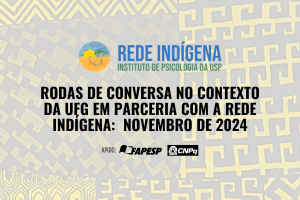
Dialogue Circles at UFG in Partnership with the Indigenous Network: May 2025
The fourth and fifth dialogue circles of the Indigenous Network’s partnership project with UFG, “Creating

Project: Emerging Notions of Health and Well-Being in the USP Indigenous Network
By Eduarda Santos Costa (PIBIC Scholarship holder, process number 2024_1071) Psychology, having developed within colonial

Conversation Circles in the Context of UFG in Partnership with the Indigenous Network: November 2024
As part of the project “Creating Spaces for Dialogue on Indigenous Peoples’ Health and Well-being,”
1st Meeting on Indigenous Psychology, Health, and Well-Being
https://youtu.be/9ev_D2PvESU Recording of the II Indigenous Psychology, Health, and Well-being Meeting, organized by the Rede
1st Meeting on Indigenous Psychology, Health, and Well-Being
1º Encontro de Psicologia Indígena, Saúde e Bem-Viver: Vivência na Casa de Culturas Indígenas. Fonte:

Cultural immersion in the Tekoha Nhanderekoa (2024)
In 2024, the members of the USP Indigenous Network had the opportunity to take part
The discussion on well-being and health within the Indigenous Network USP has encompassed topics such as psychological care for Indigenous people, food sovereignty, and animal care in Indigenous communities.
Psychological Care
The goal of this initiative is to develop and implement psychological care strategies for Indigenous people in various modalities. We understand that the social and community-specific contexts of Indigenous peoples require a transformation of theoretical-methodological concepts and psychological intervention techniques. It is crucial that professionals receive adequate training to effectively promote these transformations.
To this end, we maintain a regular study group, ensuring the continuous education of professionals in the specificities of the psychological care proposed here, as well as regular supervision of the services provided.
To contact the team providing these services, please email: atendimentoredeindigena@usp.br
Food Security and Sovereignty
The ongoing debate surrounding the Marco Temporal (Temporal Framework refers to a legal argument in Brazil that limits Indigenous land rights to territories occupied on or before October 5, 1988, the date of Brazil’s Constitution.) has exacerbated the longstanding struggles of Indigenous peoples in Brazil since the arrival of Europeans. One of the major historical issues is the reduction of their territories, whether due to land invasions, deforestation, and/or contamination from agribusiness, illegal mining, and other extractive activities. Additionally, the lack of land demarcation and official recognition by public authorities, along with violent expulsions driven by discrimination and religious intolerance, complicates the situation further.
This reality presents significant challenges in ensuring that Indigenous peoples can inhabit their sacred territories in a way that aligns with their traditional lifestyles, increasing their dependency on non-Indigenous services and products—especially those related to food. In this context, two major issues arise: food insecurity and the lack of autonomy in the production and maintenance of traditional Indigenous diets.
The Núcleo de Soberania e Segurança Alimentar (Center for Food Sovereignty and Security) seeks to support Indigenous villages and communities in achieving food sovereignty by facilitating the exchange of knowledge, seeds, and seedlings among Indigenous villages, traditional communities, and universities. It aims to strengthen the dialogue between ancestral Indigenous wisdom and agroecology, helping to restore soil fertility, agrobiodiversity, and traditional food production. When necessary and upon request from the communities, the initiative also seeks to provide targeted support to reduce food insecurity.
Animal Care
This initiative is dedicated to developing solutions to address the overpopulation of dogs and cats in Indigenous communities. It involves discussions with community leaders, Indigenous health and sanitation agents, Indigenous educators, veterinarians, etc. to (find culturally appropriate ways to care for animals in alignment with the community’s needs and values.) (find ways to care for the animals in accordance with the community.)


